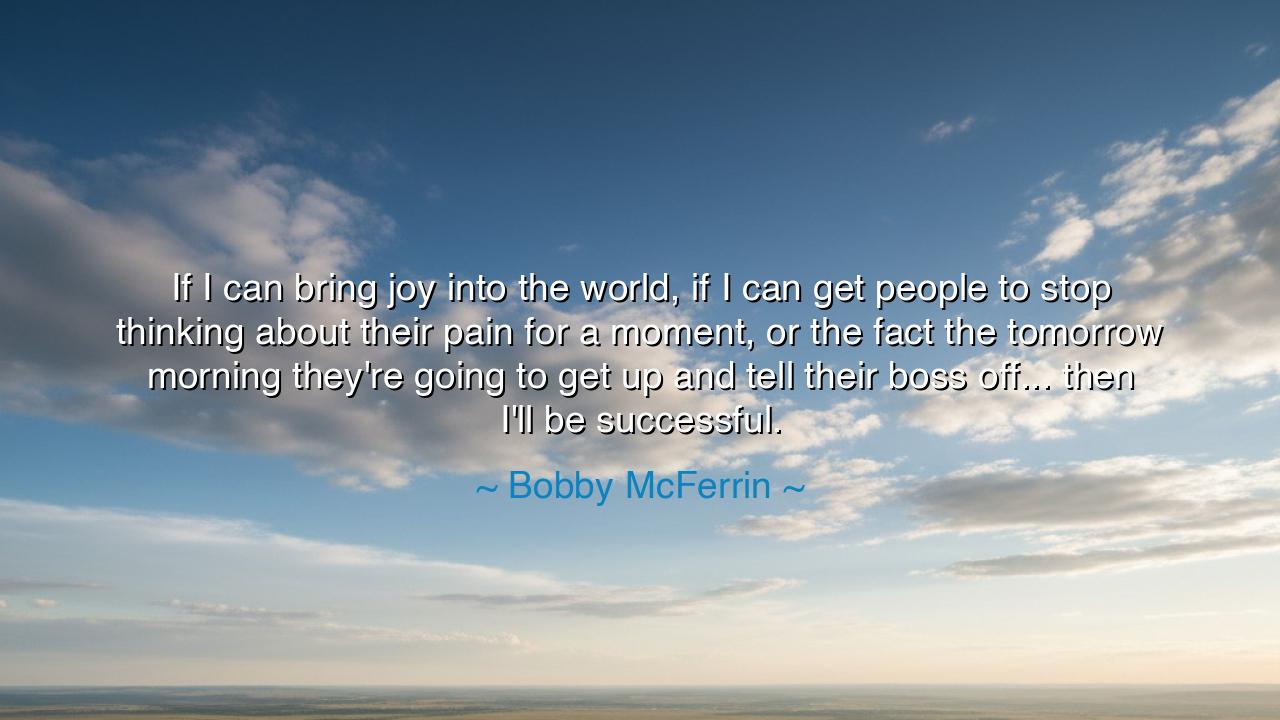
If I can bring joy into the world, if I can get people to stop
If I can bring joy into the world, if I can get people to stop thinking about their pain for a moment, or the fact the tomorrow morning they're going to get up and tell their boss off... then I'll be successful.






Children, gather close, for I bring to you a lesson that speaks to the heart of true success—the kind that comes not from wealth or power, but from the power to uplift the hearts of others. In the words of Bobby McFerrin, a man whose music has touched the souls of millions, we hear a profound truth: "If I can bring joy into the world, if I can get people to stop thinking about their pain for a moment, or the fact that tomorrow morning they're going to get up and tell their boss off... then I'll be successful." These words are a reflection of the deepest kind of success—the success that comes from serving others with your gifts, and from helping them experience moments of lightness, even in the darkest of times.
McFerrin’s statement reveals a deep understanding of the human condition. Life is filled with pain, struggles, and challenges—all of us face these trials, whether they are internal battles or external conflicts. Success, McFerrin teaches us, is not measured by how much we accumulate or achieve, but by the moments we can offer to others that help them break free from their burdens, even if for a short time. Joy, he says, is a tool—one that allows us to reach beyond the constraints of our personal trials and connect with others in a way that is deeply human. Bringing joy into the world is a noble pursuit, for it touches the heart and soothes the soul.
Consider, children, the great healers of the ancient world—like Hippocrates, the father of medicine. Though he was renowned for his knowledge and skills in healing the body, his greatest success was not simply in curing illness, but in offering his patients hope. The act of healing is not just about treating the body, but also about relieving the spirit from the weight of fear and despair. Hippocrates understood that by restoring balance and peace to the body, he could also help to lift the mental and emotional burdens that people carried. McFerrin’s words echo this ancient wisdom: true success is found not just in fixing what is broken, but in lifting the spirit through moments of joy, laughter, and lightness.
In a similar vein, think of the great warriors who, though they fought many battles, were often remembered not just for their victories, but for their ability to inspire their people with courage. Alexander the Great, though a conqueror, understood the importance of morale in his army. He knew that his soldiers could face incredible hardships, but it was in raising their spirits and reminding them of their higher purpose that they were able to press on. McFerrin’s success is not measured by how many people he convinces to forget their problems permanently, but by the fleeting moments he creates, where people can experience joy, even amidst the struggle. His music, much like a battle cry or a rallying speech, becomes a source of strength, lifting the spirits of those who hear it.
The lesson here, children, is one of selfless service and emotional wisdom. True success is not about personal gain or achievement; it is about the impact we have on others. McFerrin’s wish to bring joy into the world, to help others forget their pain and struggles, shows us that the greatest gift we can give is connection—the ability to remind others that life is more than just their burdens. Joy becomes a balm for the soul, a reminder that even in the darkest times, there is light, and we are all connected in our shared humanity. The world will always have pain, but if we can help others experience even a small moment of joy, we will have succeeded.
Consider the story of Confucius, the ancient philosopher who believed that the true measure of a man’s success was not in his wealth, but in his relationships with others. He taught that through benevolence, virtue, and wisdom, one could bring peace and joy to the world. Confucius did not simply teach about good conduct—he also sought to uplift the hearts of his people, to help them find meaning in their lives through connection, respect, and joyful living. In this way, McFerrin’s pursuit of joy is in line with the greatest teachings of Confucius: that we are all part of a greater whole, and it is through the small acts of kindness and joy that we find true success.
So, children, I charge you now to seek the path of joy in your own lives. Do not measure your success by the world’s standards—by wealth, power, or fame—but by the moments of joy you can bring to others. Whether through art, words, or simply a smile, seek to offer relief to others by helping them forget their pain, even if just for a moment. McFerrin’s music reminds us that joy is a gift we can share, a tool that can heal and uplift. You do not need to be a famous musician to offer joy to the world; each of you, in your own way, can create moments of happiness and lightness for those around you. That is true success—not the absence of difficulty, but the presence of joy, even in the face of adversity.






AAdministratorAdministrator
Welcome, honored guests. Please leave a comment, we will respond soon